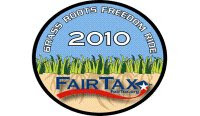Below is an excerpt from an e-mail from a FairTax volunteer:
Under frequently asked questions on the FT website, the question "What do we experience in the transition from the income tax to the FairTax?" is No. 46. The reply is:
Everyone will have to think about taxes in a different way. Income -- what we earn -- no longer has to be documented, measured, and tracked for tax purposes. The only relevant measure of our tax liability is the amount we choose to spend on final, discretionary consumption. Tax-related issues are suddenly a lot simpler and more straightforward than they used to be. The aggravation and anxiety associated with “April 15th ” disappears forever after passage of the FairTax. The FairTax is not new -- most Americans come into contact with sales taxes daily, since 45 states currently use them to collect state revenues. It is easier to switch from an income tax to the FairTax system than it is to switch from gallons to liters, or from feet to meters! Of course, those who depend on the structure and complexity of our current system (e.g., tax lobbyists, tax preparers, and tax shelter promoters) will have to find more productive economic pursuits. However, everyone will have enough advance notice to adjust to the new system.
Job creation booms. Residential real estate booms. Financial services boom. Exports boom. Retail prospers. Farming and ranching prosper. Churches and charities prosper. Civil liberties are enhanced. In short, it is difficult to imagine the far-reaching, positive effects of this change. Though this tax policy is exactly what our Founding Fathers counseled us to do with the Federalist Papers and the Constitution.
Subscribe to:
Post Comments (Atom)

3 comments:
Ah, taxes. You can reduce them - but you need to cut government spending as well. Or you can switch them around so one group of taxpayers pays less and another group more.
What you can't do- even with smoke and mirrors - is reduce taxes for everyone and still have the same level of government spending.
"What do we experience in the transition from the income tax to the FairTax?" is No. 46. The reply is:
.... The only relevant measure of our tax liability is the amount we choose to spend on final, discretionary consumption.
Certainly true.So what happens to taxes in the first six months?
Consider an American made auto, produced under the 'old' system where taxes are embedded. Come changeover day, it is double taxed as the Fair Tax is applied. Who would buy an auto - or anything else durable - in the first year of Fair Tax when you know you could buy it far cheaper pre changeover?
So a consumer splurge followed by a slump and very little tax revenue at transition?
All goods for sale when the FairTax becomes law are exempt from the sales tax so they are NOT double taxed. That's one reason this is called the "Fair Tax". You need to read "The FairTax Book" or read the actual bill (HR25or S1025.) This transition is spelled out quite clearly.
With the FairTax, you are only taxed once. With the income tax, you are taxed all the way through the manufacturing process, thereby ending up with a finished product that is loaded with apx. 22% in embedded taxes.
Post a Comment